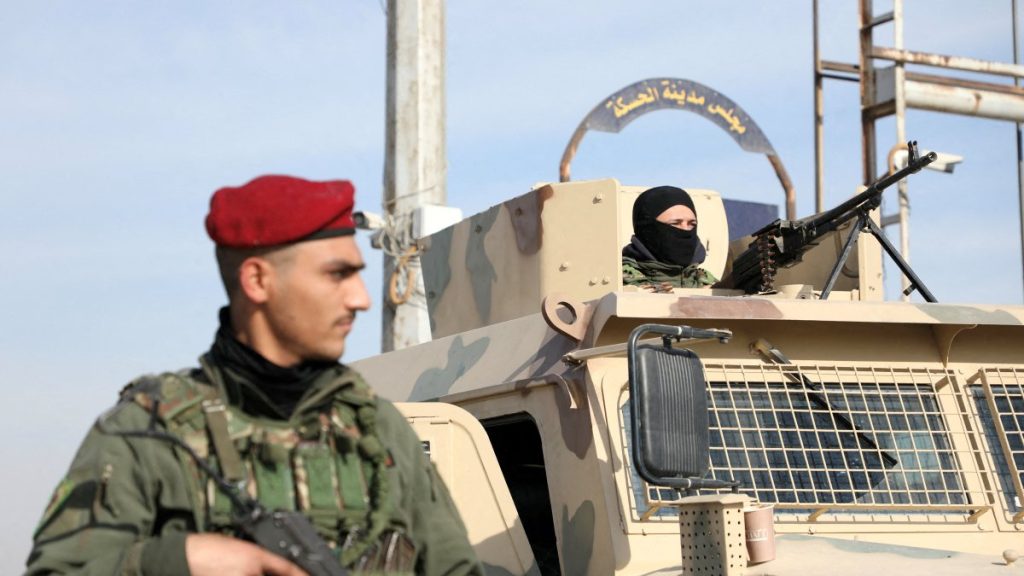The PKK’s U.S.-backed Syrian offshoot, the YPG, is courting Iraqi Kurds in an apparent push to garner support at a time when the political upheaval in Syria has left the terrorist group facing an uncertain future.
Hoshyar Zebari, a senior Kurdistan Democratic Party (KDP) official, said KDP leader Masoud Barzani and YPG leader Ferhat Abdi Şahin, code-named “Mazloum Abdi,” met in Irbil, the capital of the semiautonomous Kurdish region in northern Iraq.
Zebari said the meeting was a “significant achievement to strengthen Kurdish unity and position” during Syria’s transitional phase.
The meeting came weeks after the fall of the regime of former Syrian leader Bashar Assad in a lightning offensive by anti-regime groups and amid an intensified campaign by the Syrian National Army (SNA) against PKK/YPG terrorists in northeast Syria.
A senior KDP member, who spoke on condition of anonymity because he wasn’t authorized to brief journalists, said that the talks between Barzani and Şahin focused on unifying the “Kurdish position” within Syria and exploring ways to separate the YPG from the PKK, a group designated a terrorist organization by Türkiye, United States and the European Union. He said that the KDP leader had argued that such a move could open doors for broader international support, particularly through the KDP’s relationships with both the United States and Türkiye.
The official said that Barzani had also stressed the importance of presenting a “united Kurdish front” in Syria to negotiate with the new de facto Syrian government from a position of strength. He said that Kurdish political gains in Iraq, including constitutional recognition, could serve as a model for Syria’s Kurds.
The YPG, which has occupied northeast Syria for the past decade, has been fighting the SNA, an umbrella group for former opposition forces. Türkiye regards the YPG as an extension of the PKK and has hailed the recent Operation Dawn of Freedom by the SNA to capture towns from the YPG.
The PKK/YPG was the culprit of attacks on Turkish border towns during Syria’s civil war and, most recently, was accused of carrying out a fatal bombing in Istanbul’s Istiklal Street in October 2022.
At the same time, talks between politicians from the PKK-linked Peoples’ Equality and Democracy Party (DEM Party) and jailed figureheads linked to the PKK, including PKK leader Abdullah Öcalan, have been gathering steam as they try to end 40 years of PKK terrorism in Türkiye.
In the security vacuum of Syria’s new leaders trying to form a new national army following the fall of Assad, there are concerns about a resurgence of the Daesh terrorist group in Iraq and Syria.
The U.S., which is allied with the YPG, claims the terrorist group has helped fight Daesh in Syria and militarily helps the group keep its occupied territories in the country’s northeast, much to Ankara’s chagrin.
Earlier this week, Barzani’s envoy, Hamid Darbandi, met with Şahin in Hassakeh, in northeastern Syria. The KDP in Iraq has friendly relations with Türkiye and has been at odds with the YPG and other wings of the PKK.
The KRG also expressed support for Türkiye’s new terror-free initiative. Ankara often criticizes the PKK’s gaining footing in KRG-controlled regions like Sulaymaniyah and urges both Irbil and Baghdad not to tolerate terrorists.
President Recep Tayyip Erdoğan earlier this week hit out at international actors for staying in Syria, namely the U.S.-led anti-Daesh coalition, over “fabricated excuses like Daesh.”
Türkiye has long complained of the U.S. working with the PKK/YPG on the pretext of fighting Daesh. Turkish officials say that using one terrorist group to fight another makes no sense.
“If there is really a fear of the Daesh threat in Syria and the region, the biggest power that has the will and power to resolve this issue is Türkiye,” Erdoğan said, adding that Ankara and Damascus would “crush the heads of Daesh, the YPG and other terrorist organizations in a short time.”
U.S. CENTCOM in Syria
Meanwhile, U.S. Central Command (CENTCOM) Cmdr. Gen. Michael Erik Kurilla traveled to Syria on Thursday to engage in talks.
Kurilla met with U.S. military commanders and service members as well as Washington’s “Defeat-ISIS partners,” the PKK/YPG, to get an assessment of the ongoing counterterrorism campaign and efforts to prevent the resurgence of the terrorist group in the region as well as the evolving situation in Syria, CENTCOM said in a statement.
He also visited the al-Hol camp in northern Syria, which is run by the PKK/YPG terror group.
“Without international repatriation, rehabilitation and reintegration efforts, these camps risk creating the next generation of ISIS,” CENTCOM also said. It also stressed that over 9,000 Daesh-affiliated detainees from 50 countries are being held in PKK/YPG-run facilities in Syria, calling it a possible Daesh “army” waiting in the wings.
According to the statement, Kurilla said, “CENTCOM remains focused on supporting the repatriation of al Hol and al-Roj camp residents back to their countries of origin.”
“Gen. Kurilla also reiterated that CENTCOM will continue to work with the international community to transfer ISIS fighters to their countries of origin for final adjudication,” it added.


